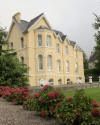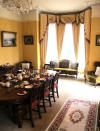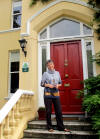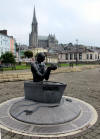
Ireland-Scotland 2013 - Cobh
return to Ireland Scotland Index
return to main index
 |
look for Killarney, Cork & Cobh |
Cork - When we drove from Killarney to Cobh, we had a two hour stop in Cork, Ireland's second city. After walking around for an hour, we had lunch. I was amazed that at 54 degrees north you can get a perfectly ripe 1/2 avocado with your salad. Otherwise, it was a grey & drizzly day and the Cork photos were so-so and were later removed.
Cobh - we arrived in "Cove" at our B&B in late afternoon, and after checking in, walked to town. It seemed sleepy & we saw no other tourists around, and enjoyed a quiet waterside dinner.
Cobh is an atmospheric port town, with a ton of shipping & British naval history. The town's connections to the Titanic (1912) and Lusitania (1915) disasters brings in cruise ship crowds, during the summer tourist season.
We stayed here only one night. We're in County Cork now so red & white Hurling flags were prominent.
We slept in a bit at the B&B and had a luxurious 9:30 am breakfast in a Victorian home once belonging to a British Naval Admiral, who built this house & later his son's house, next door.
 |
the B&B |
 |
breakfast room |
 |
 |
our host |
 |
the son's house |
On the walk into town, for a guided tour, we passed the Titanic & Father Frank Brown museum.
 |
HMS Titanic |
 |
we missed the Centennial by a year |
 |
|
 |
from a Father Brown photo note 1 |
 |
looks official | ||
 |
back in town |
 |
only a few more days untill the final hurling match |
 |
center city |
 |
holding a currach, note 2 |
 |
note 1 - In 1912, Father Brown, a Catholic priest at St Catherine's Cathedral at Cobh, was into photography and got permission from the Bishop to photograph the maiden voyage on board S.S. Titanic, from the shipyard in Belfast to Liverpool and then to Cobh. On the short cruise, Father Brown took a lot of photos of the passengers, many of whom would not survive. They are shown in a museum here.
In Cobh, Father Brown pleaded with the Bishop to be allowed to go on to NYC with the ship but this was too much for the bishop. For years afterwards Father Brown traveled widely in Ireland, presenting his Titanic slide show & lectures to small or large audiences. Slide shows were new tech, and immensely popular.
note 2 - A Currach is a traditional ocean-going row boat. The old Irish legend (or myth) about St. Brendan sailing and rowing west in a currach with 17 other monks, possibly all the way to Newfoundland, in the 400s, is fantastic. It took seven years & along the way they encountered birds speaking Gaelic and sea monsters.
One time they enjoyed getting off the curraghs to make a fire & cook lunch on the back of a whale. They were surprised how long it took the whale to notice. Apparently they got back to the curraghs before the whale reacted. Did I mention that the Irish are great story-tellers, with a wealth of ancient mythology to draw upon ?
We met our guide Adeen at 11 am, for a 45-minute walking tour. We learned that this town (when known as Queenstown) had an illustrious history as a British Naval port. Queen Victoria allowed the name to be changed back to the Irish name of Cobh in the 1840s.
Cobh's importance is also related to the Irish Potato Famine, because (starting in the 1840s) when the Irish left in droves, many emigrated to the US or Canada from Cobh.
 |
local history walking tour |
 |
Adeen was a good guide |
 |
We left Cobh around 2 pm & had a rainy 90 minute drive to Tramore, another small SE coastal town, where the story of tragic endings for sea-faring passengers continues.
go to day 6 & 7 - Tramore & Waterford
return to Ireland Scotland Index
return to main index